The World Cup starts next month - yes, NEXT MONTH - which means the finishing touches to the tournament should be wrapping up in Russia.
One of the most important aspects of hosting a successful World Cup is ensuring the stadiums where the matches will be played are in tip-top condition - who recalls the difficulties South Africa had with Mbombela Stadium in 2010, when the pitch had to be relaid twice just a couple of months before the start of the World Cup?
Below you'll find our overview of the stadia where the best in the world will be plying their trade this summer - including stadium capacity, construction year and which matches each venue will host.
12. Kaliningrad Stadium - Kaliningrad
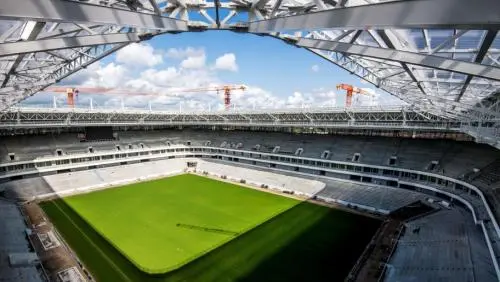
Capacity: 35, 212
Opened: Scheduled for 2018
Matches:
16 June – Croatia vs Nigeria – Group D
22 June – Serbia vs Switzerland – Group E
25 June – Spain vs Morocco – Group B
28 June – England vs Belgium – Group G
If you looked at Kaliningrad on a map, you wouldn't think it's in Russia. Technically, the area is a Russian exclave on the Black Sea, nestled between Poland and Lithuania.
The stadium should be completed in time for its first group game between Croatia and Nigeria, but it's been a rough road as the venue has been delayed countless times - largely due to the bankruptcy of the company that initially designed the place. After the World Cup the stadium's capacity will be reduced by 10,000 seats and become home to Russian second-tier side Baltika Kaliningrad. England will play their final group game against Belgium here.
11. Volgograd Arena - Volgograd
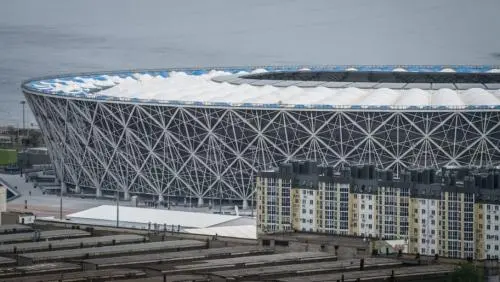
Capacity: 45,568
Opened: Scheduled for 2018
Matches:
18 June – Tunisia vs England – Group G
22 June – Nigeria vs Iceland – Group D
25 June – Saudi Arabia vs Egypt – Group A
28 June – Japan vs Poland – Group H
Situated on the site of the demolished Central Stadium, Volgograd Stadium has quite the location. The design of the arena is also distinctive, and FIFA claims that the "special way in which the stadium's roof has been constructed, with cables reminiscent of the spokes of the wheel on a bicycle, lends the arena an extra element of airiness."
Volgograd Stadium hosts England first group match against Tunisia on June 18.
10. Ekaterinburg Arena - Ekaterinburg
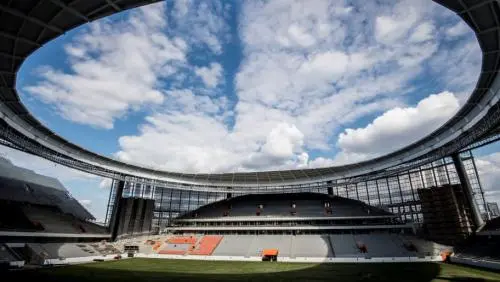
Capacity: 35,696
Opened: 1953
Matches:
15 June – Egypt vs Uruguay – Group A
21 June – France vs Peru – Group C
24 June – Japan vs Senegal – Group H
27 June – Mexico vs Sweden – Group F
Resembling a half-completed alien spaceship, Ekaterinburg Arena is certainly...something. The stadium was opened in 1953, but because FIFA's World Cup regulations state that each venue have a minimum capacity of 35,000, facility hosts installed temporary stands behind each goal to boost stadium seating.
You can see the result above, and it's oddly captivating to see such huge swathes of space between the stands and pillars.
9. Mordovia Arena - Saransk
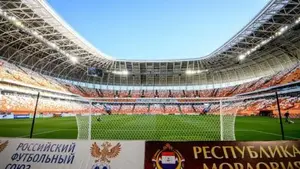
Capacity: 44,442
Opened: Scheduled for 2018
Matches:
16 June – Peru vs Denmark – Group C
19 June – Colombia vs Japan – Group H
25 June – Iran vs Portugal – Group B
28 June – Panama vs Tunisia – Group G
Another stadium that encountered its fair share of delays and funding issues prior to completion - but boy is it colourful.
But hang on a minute - it does look oddly...familiar. In fact, Mordovia Arena bears a striking resemblance to Johannesburg’s FNB Stadium, which was used in the 2010 World Cup (something that a number of South Africans are not too happy about). Following the World Cup, the arena will become home to FC Mordovia Saransk of the Russian Premier League.
8. Rostov Arena - Rostov-on-Don
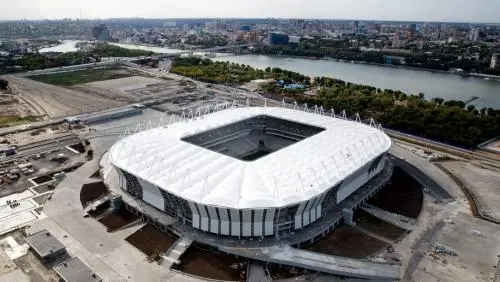
Capacity: 45,145
Opened: Scheduled for 2018
Matches:
17 June – Brazil vs Switzerland – Group E
20 June – Uruguay vs Saudi Arabia – Group A
23 June – Korea Republic vs Mexico – Group F
26 June – Iceland vs Croatia – Group D
2 July – 1G vs 2H – Round of 16
Another stadium that's been purpose-built for the World Cup, the construction of the stadium unearthed intact shells from World War II.
It looks like a solid, yet uninspiring stadium. Hopefully an explosive atmosphere will make up for it.
7. Spartak Stadium - Moscow
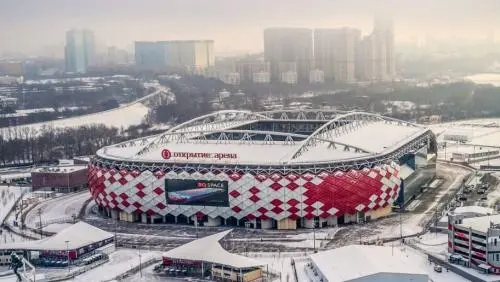
Capacity: 43,298
Opened: 2014
Matches:
16 June – Argentina vs Iceland – Group D
19 June – Poland vs Senegal – Group H
23 June – Belgium vs Tunisia – Group B
26 June – Serbia vs Brazil – Group C
3 July – 1H vs 2G – Round of 16
Just look at that picture - what could be more Russian? A red-and-white stadium, built on the site of a former airfield, located deep in snowy Moscow.
Considering the location, looks (picture it in summer, ok?) and prestige of the venue (it's the home of 22-time Soviet/Russian champions Spartak Moscow), it's somewhat surprising that it wasn't selected to host a quarter-final match, at the least. Still, it will get a knockout game in the round of 16 - which will likely be either Poland/Colombia vs Belgium/England.
6. Samara Arena - Samara
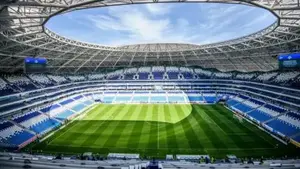
Capacity: 44,807
Opened: Scheduled for 2018
Matches:
17 June – Costa Rica vs Serbia – Group E
21 June – Denmark vs Australia – Group C
25 June – Uruguay vs Russia – Group A
28 June – Senegal vs Colombia – Group H
2 July – 1E vs 2F – Round of 16
7 July – W55 vs W56 – Quarter Final
Another stadium that looks like a UFO, Samara Arena was designed with space in mind - given the area's famous aerospace industry (the Vostok 1 rocket, which made the first manned flight in history into space, was assembled in Samara).
The brand new stadium will host a quarter final, then become the home of club side Krylia Sovetov and be renamed to the Cosmos Arena. Fitting.
5. Nizhny Novgorod Stadium - Nizhny Novgorod
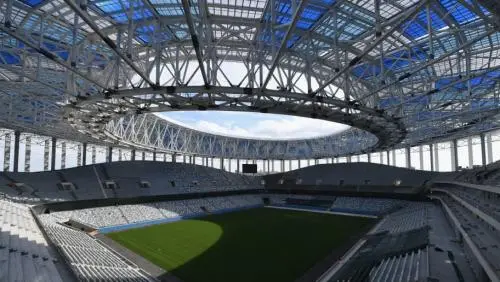
Capacity: 45,331
Opened: 2018
Matches:
18 June – Sweden vs Korea Republic – Group F
21 June – Argentina vs Croatia – Group D
24 June – England vs Panama – Group G
27 June – Switzerland vs Costa Rica – Group E
1 July – 1D vs 2C – Round of 16
6 July – W49 vs W50 – Quarter Final
Now this really is a gorgeous stadium, with an intricately designed roof that is meant to embody the region's nature. FIFA describes its circular design as a "semi-transparent undulating facade."
After the World Cup, the stadium will be inherited by FC Olimpiyets Nizhny Novgorod - a club that was formed the same year (2015) construction on the arena began.
4. Kazan Arena - Kazan
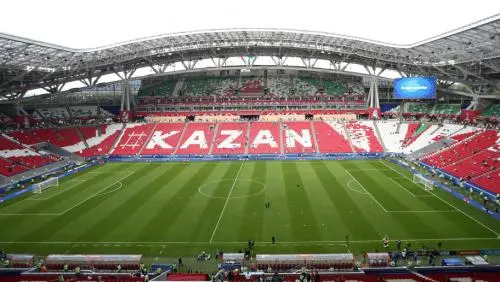
Capacity: 44,479
Opened: 2013
Matches:
16 June – France vs Australia – Group C
20 June – Iran vs Spain – Group B
24 June – Poland vs Colombia – Group H
27 June – Korea Republic vs Germany – Group F
30 June – 1C vs 2D – Round of 16
6 July – W53 vs W54 – Quarter Final
Now this is a proper football stadium - with the name of the home team across the seats, as it should be (complete with a # too, very millennial).
If it's got a familiar look to it (the Emirates, or Wembley anyone?), that's because the architects who designed the place also oversaw the construction of those two famous venues. Cool fact about Kazan Arena - it also held some of the competitions for the 2015 World Aquatics Championships (the pitch was replaced by two swimming pools).
3. Fisht Stadium - Sochi
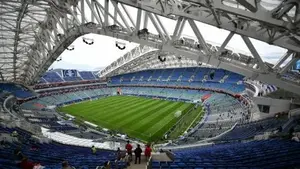
Capacity: 47,700
Opened: 2013
Matches:
15 June – Portugal vs Spain – Group B
18 June – Belgium vs Panama – Group G
23 June – Germany vs Sweden – Group F
26 June – Australia vs Peru – Group C
30 June – 1A vs 2B – Round of 16
7 July – W51 vs W52 – Quarter Final
Blessed with an amazing view of the black sea, Fisht Stadium was built to host the opening and closing ceremonies of the 2014 Sochi Winter Olympics. During the Games the stadium had a roof, but that has since been removed to accommodate football matches - including the Confederations Cup in 2017.
The stadium is owned by the Russian government, and the national team will use it as a training base throughout the World Cup.
2. Saint Petersburg Stadium - Saint Petersburg
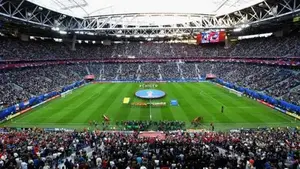
Capacity: 68,134
Opened: 2017
Matches:
15 June – Morocco vs Iran – Group B
19 June – Russia vs Egypt – Group A
22 June – Brazil vs Costa Rica – Group E
26 June – Nigeria vs Argentina – Group D
3 July – 1F vs 2E – Round of 16
10 July – W57 vs W58 – Semi Final
14 July – L61 vs L62 – Third Place
Also known as the Krestovsky Stadium - where Zenit Saint Petersburg play their home games - this bad boy was completed eight years behind schedule and 540% over budget.
Still, the end result of all that work and money is quite spectacular, and fans will get to enjoy the semi-final of the World Cup here (the stadium will also be one of the host venues for the Euro 2020 finals).
1. Luzhniki Stadium - Moscow
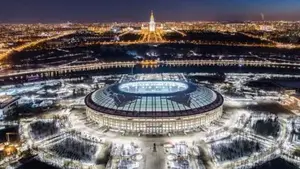
Capacity: 81,006
Opened: 1956
Matches:
14 June – Russia vs Saudi Arabia – Group A
17 June – Germany vs Mexico – Group F
20 June – Portugal vs Morocco – Group B
26 June – Denmark vs France – Group C
1 July – 1B vs 2A – Round of 16
11 July – W59 vs W60 – Semi Final
15 July – W61 vs W62 – Final
The centrepiece of the tournament is the Luzhniki Stadium in Moscow, which will host the opening match of the World Cup and the final. The stadium is the largest in Russia, and hosted the opening and closing ceremonies of the 1980 Olympics, as well as the 2008 Champions League final.
Before the stadium was renovated with a roof and other amenities in 1996, it could reportedly hold 100,000 people. In 1982, there was a deadly human crush at the stadium during a UEFA Cup match between FC Spartak Moscow and Dutch side HFC Haarlem when fans started rushing to the exits in order to catch the metro. 66 people, mostly adolescents, died in the stampede.
- 90Min